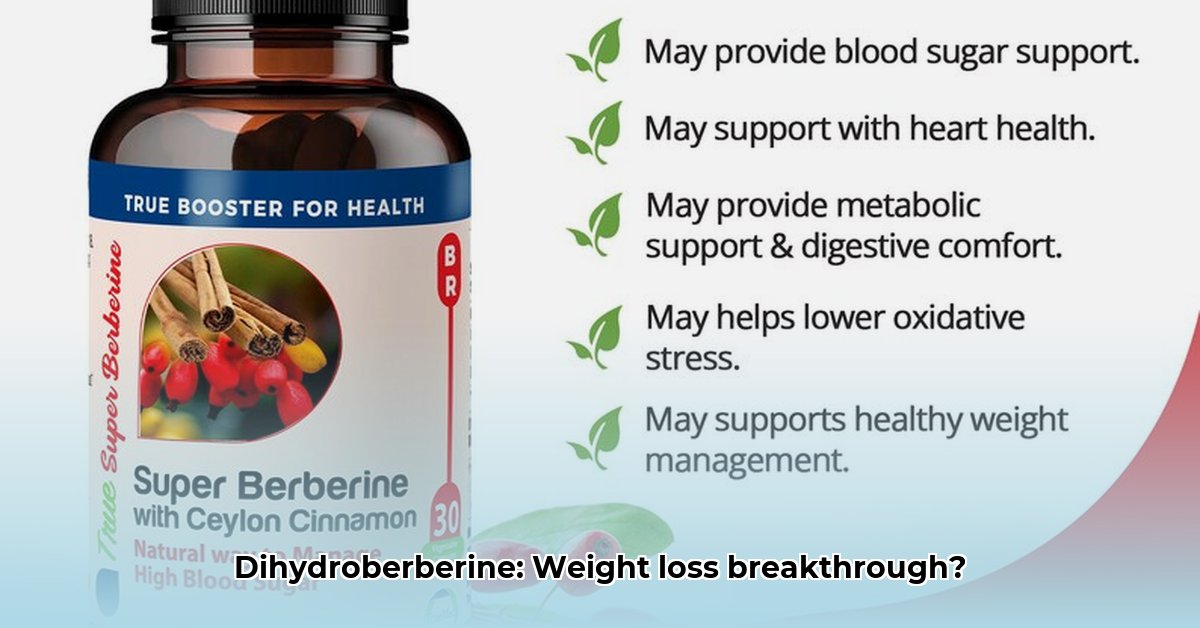
Dihydroberberine (DHB): A Closer Look at Berberine's Cousin
Dihydroberberine (DHB) is a naturally occurring compound closely related to berberine, a supplement known for its potential metabolic benefits. While berberine has garnered significant attention for its impact on blood sugar, cholesterol, and potentially weight management, DHB is touted as a more bioavailable form, meaning the body absorbs it more efficiently. However, the research supporting DHB's efficacy, particularly regarding weight loss, remains limited. This article will explore the current state of knowledge, weighing the promising aspects against the considerable knowledge gaps.
Understanding Dihydroberberine's Mechanism of Action
Berberine's potential mechanisms of action, which DHB might share due to its structural similarity, include enhancing insulin sensitivity, positively impacting gut microbiota, and favorably influencing lipid profiles. Improved insulin sensitivity could lead to better blood sugar control, while changes in gut bacteria may contribute to overall metabolic health. These effects, if replicated by DHB, could theoretically support weight management. However, direct evidence of these mechanisms at play specifically with DHB in humans is lacking.
Evidence Review: What the Research Shows
The available research on DHB's effects on weight loss and other metabolic parameters is scarce and often limited by small sample sizes and focus on specific products. Many studies utilize a particular DHB formulation, GlucoVantage. This limits the generalizability of findings to other DHB supplements.
Blood Sugar Control
While berberine has shown promise in managing blood sugar levels, studies directly investigating DHB's impact are limited. One small study using GlucoVantage showed no clear superiority over berberine or a placebo in improving blood sugar control. More comprehensive research is needed to establish whether DHB offers significant advantages in this area. Isn't it crucial to have robust clinical trials before making definitive claims?
Cholesterol and Triglycerides
Similarly, the evidence linking DHB to improvements in cholesterol and triglyceride levels is weak. While berberine shows some potential in this regard, direct evidence from studies specifically on DHB is minimal. This presents a significant gap in our understanding of DHB's full metabolic effects. Can we truly assess its overall cardiovascular impact without more robust data on lipid profiles?
Bioavailability
This is where DHB potentially excels. Multiple reports suggest superior absorption compared to berberine, leading to higher blood levels of the active compound. This enhanced bioavailability could translate into greater efficacy, but more research is needed to confirm this relationship and establish optimal dosing strategies. It is important to note that this increased bioavailability is often demonstrated using GlucoVantage, not necessarily all DHB supplements.
Potential Benefits and Risks of Dihydroberberine
Based on the limited existing research and the known effects of berberine, the following points can be considered:
Potential Benefits:
- Improved Bioavailability: Potentially higher absorption compared to berberine, leading to potentially greater effectiveness at lower doses.
- Potential Metabolic Improvements: May offer similar benefits to berberine, including blood sugar regulation and cholesterol modulation, although currently unproven.
Potential Risks:
- Limited Research: Insufficient human studies to conclusively establish its efficacy and safety for weight loss or other health claims.
- Study Limitations: Most studies using a single DHB product limits generalizability to other brands.
- Lack of Long-Term Data: Long-term safety and efficacy remain unknown.
- Potential Side Effects: Like berberine, gastrointestinal issues may occur.
Dosage and Considerations: A Cautious Approach
Currently, there is no standardized recommended dosage for DHB. The doses employed in various studies have varied considerably, emphasizing the need for caution and professional guidance. Consulting a healthcare provider is crucial before using DHB, especially if you have pre-existing conditions or are taking other medications.
Conclusion: Promising but Uncertain
DHB's superior bioavailability compared to berberine presents a tangible advantage, potentially enhancing its therapeutic impact. However, conclusive evidence supporting its efficacy for weight loss or other metabolic benefits is currently lacking. Future research is essential to address the significant knowledge gaps, including larger, well-designed trials exploring its effects on various metabolic parameters in diverse populations. While DHB holds promise, it's crucial to approach it with measured expectation and consult a qualified healthcare professional before incorporating it into your routine. Remember: a healthy lifestyle plays a vital role in long-term weight management.